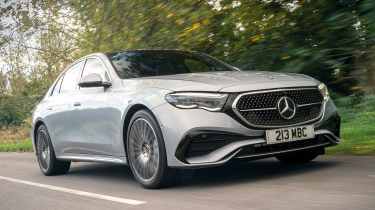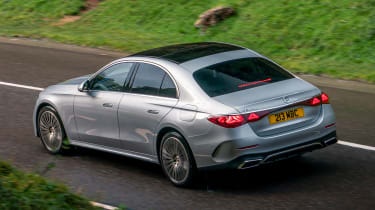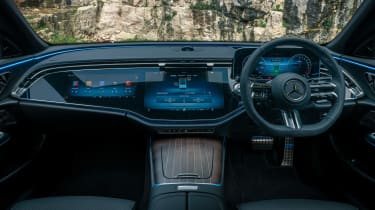Mercedes E-class 2024 review – plug-in hybrid E300e tested
The new Mercedes E-class proves there’s still life in the traditional, well engineered exec saloon
You have to feel for Mercedes. It spent a sizable country’s GDP developing its EQE electric saloon, but has since launched a new regular E-class that, in E300e plug-in hybrid trim, knocks the EV out of the continent in every single area.
Forget the noise and nonsense around plug-in hybrids not being a solution for those unwilling to make the jump to a full EV just yet. Some say that hauling two powertrains around with you in a PHEV is a self-defeating prospect, and while this might have been true when the original PHEVs arrived over a decade ago and were, quite frankly, an embarrassment, the current crop are exactly what many need today: zero emission driving in urban environments and not a whiff of charge anxiety when further afield.
With a usable and realistic electric range of 70 miles from its 25kWh battery and a 2-litre, turbocharged four-cylinder petrol engine that’s good for another 350 miles hooked up to a nine-speed auto, the E300e passes up on the headline grabbing attention and instead just gets on with it.
In the single-digit temperatures of mid-December we achieved 60 miles of electric driving on every road type at the same speeds we would cover them in an ICE powered E-class before the four-pot ignited. At no time did the electric drive feel a hindrance, its instant torque more manageable and less all or nothing compared to a pure EV, which makes it so much calmer and less frantic.
More reviews
In-depth reviews
Reviews
- Mercedes-Benz E55 AMG (W211, 2003 - 2006): review, specs and buying guide
- Mercedes-AMG E53 Hybrid 4Matic+ 2024 review – AMG’s first long-distance hybrid tested
- Mercedes E-class 2024 review – plug-in hybrid E300e tested
- Mercedes-AMG E53 2021 review – brimming with tech, but missing the charisma of an M550i
- Mercedes E-class 2020 review – new E450 a smooth operator
- New Mercedes-Benz E-class review
- Mercedes E400d AMG-Line estate review
Even when the battery is running low there’s always some charge left to start every journey in silence, and the switch to the 207bhp petrol engine is seamless. Although not serene, as it’s not the quietest of engines. It sounds coarse at times and isn’t the smoothest across its power and torque bands (406lb ft combined by the way). But despite hauling 2210kg around (400kg more than the E200 that shares the same internal combustion engine) it doesn’t feel breathless or lethargic. For the driving it’s designed to do there’s little to complain about how the E300e deploys its energy.
Customers in the UK are only able to experience the E-class with steel springs and adaptive dampers, with air suspension and rear-wheel steering not available and unlikely to be for some time. This more traditional set-up doesn’t impact the E-class’s composure, its ride is calm and measured in its delivery, with no unexpected movements through the cabin. There’s strong body control too and the whole car feels engineered and set-up to be the relaxed exec it needs to be, although this does mean the steering is overly light, which doesn’t make for a particularly precise front end. Not a deal breaker, as the E-class has never been a car to hustle.
Larger road surface imperfections are harder to contain and throw-up the shortcomings of not having a set of air-filled bags to suspend the car on. And depending on the road’s surface - older concrete types - there’s more tyre noise than you might be expecting.
From inside the E-class feels a considerable step on from current Mercedes products in terms of fit and finish (it’s one of the first Mercedes we’ve driven in a long time without any squeaks or rattles), but some of the plastics feel harsh and brittle with surprisingly sharp edges, although this down to the rest of the interior being to such a high standard that these imperfections stand out.
There’s an intuitive nature to the controls, too. Granted, there are two sizable screens, with the passenger also getting their own, but the smaller ‘superscreen’ setup highlights the absurdity of the hyperscreens Mercedes fits in other models. A simple button marked with an outline of the car takes you directly to the lane keep assist off button (although this requires turning off everytime the car is restarted), and the rest of the controls are logical to use.
The tech overload is a bit much, with everything from interior lights that can pulse to the conversation between passengers or the sound coming from the entertainment system. There’s also a ‘4D’ surround sound system that includes speakers in the seats that seem to make you feel physically sick. But ignore these, dial them down or switch them off completely and the E-class is one of those cars that simply gets on with doing everything to a higher than expected standard it was designed for. Then again, it costs from £70,900 so excuses should be very few and far between.
As for the 'should I, shouldn’t I?’ switch to an EV debate that continues to tie people’s car purchasing decision making in knots, if your circumstances require you to have a large saloon with some element of electric propulsion the E300e is a pretty good place to start.







